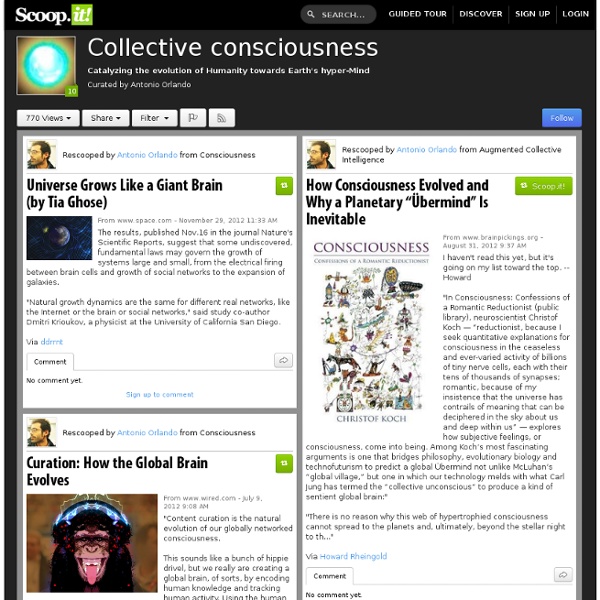



Qualia In philosophy, qualia (/ˈkwɑːliə/ or /ˈkweɪliə/; singular form: quale) are what some consider to be individual instances of subjective, conscious experience. The term "qualia" derives from the Latin neuter plural form (qualia) of the Latin adjective quālis (Latin pronunciation: [ˈkʷaːlɪs]) meaning "of what sort" or "of what kind"). Examples of qualia include the pain of a headache, the taste of wine, or the perceived redness of an evening sky. As qualitative characters of sensation, qualia stand in contrast to "propositional attitudes".[1] Daniel Dennett (b. 1942), American philosopher and cognitive scientist, regards qualia as "an unfamiliar term for something that could not be more familiar to each of us: the ways things seem to us".[2] Erwin Schrödinger (1887–1961), the famous physicist, had this counter-materialist take: The sensation of color cannot be accounted for by the physicist's objective picture of light-waves. Definitions[edit] Arguments for the existence of qualia[edit] E. J.
Augmented Collective Intelligence About Rocket Fuel | Rocket Fuel Inc. At Rocket Fuel, we want to turn online ads from an annoyance into a useful complement to your web-surfing experience. Our services are designed to deliver personalized, well-chosen ads to help you discover things that interest you—new websites, new products, new bargains – all in a privacy friendly way. Our services use anonymous identifiers associated with web browsers or devices used to access the internet, and we do not collect, use, or store personally identfiable information about consumers’ actual identities such as names, email addresses, phone numbers, or other contact or identifying information. Rocket Fuel is also a member of the Network Advertising Initiative (NAI), an organization working to educate consumers about digital advertising and to help consumers manage their online privacy, including their participation in interest based advertising. If you have any questions or comments on our privacy practices, please contact us at privacy@rocketfuel.com.
Is Consciousness Universal? For every inside there is an outside, and for every outside there is an inside; though they are different, they go together. —Alan Watts, Man, Nature, and the Nature of Man, 1991 I grew up in a devout and practicing Roman Catholic family with Purzel, a fearless and high-energy dachshund. He, as with all the other, much larger dogs that subsequently accompanied me through life, showed plenty of affection, curiosity, playfulness, aggression, anger, shame and fear. Yet my church teaches that whereas animals, as God's creatures, ought to be treated well, they do not possess an immortal soul. Only humans do. It was only later, at university, that I became acquainted with Buddhism and its emphasis on the universal nature of mind. As a natural scientist, I find a version of panpsychism modified for the 21st century to be the single most elegant and parsimonious explanation for the universe I find myself in. We Are All Nature's Children
Démocratie participative .facebook 1417406802036 Japanese Zen Buddhist Philosophy 1. The Meaning of the Term Zen The designation of this school of the Buddha-Way as Zen, which means sitting meditation, is derived from a transliteration of the Chinese word Chán. 2. There are basically two methods utilized in meditation practice in Zen Buddhism to assist the practitioner to reach the above-mentioned goals, together with a simple breathing exercise known as “observation of breath count” (sūsokukan); one is the kōan method and the other is called “just sitting” (shikan taza), a form of “single act samādhi.” According to Hakuin (1685–1768), who systematized kōans, there are formally seventeen hundred cases of kōans, and if sub-questions are added to them, a total number of cases comprising the system would be roughly three thousand. On the other hand, the Sōtō school, of which Dōgen (1200–54) is the founder, does not rely on an elaborate kōan system to learn to become a Zen person, but instead follows a method called “just sitting” (shikan taza). 3. 4. 5. 6. 7. 8. 9.
Nemesis TV driller deep The Art of Living: Vipassana Meditation The following text is based upon a talk given by Mr. S.N. Goenka in Berne, Switzerland. Everyone seeks peace and harmony, because this is what we lack in our lives. We ought to live at peace with ourselves, and at peace with others. In order to be relieved of our misery, we have to know the basic reason for it, the cause of the suffering. How do we start generating negativity? Now, one way to solve this problem is to arrange that nothing unwanted happens in life, that everything keeps on happening exactly as we desire. In India, as well as in other countries, wise saintly persons of the past studied this problem—the problem of human suffering—and found a solution: if something unwanted happens and you start to react by generating anger, fear or any negativity, then, as soon as possible, you should divert your attention to something else. This solution was helpful; it worked. A good solution; it avoids both extremes—suppression and expression. This presents a practical solution.